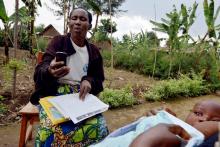HIFA is contributing to a major research project: mHEALTH-INNOVATE: exploring how healthcare workers' informal and innovative uses of mobile phones are shaping service delivery and governance in LMICs. HIFA is engaged as a subcontractor to provide a channel for multi-stakeholder involvement and discussion around the issues raised, thanks to our wide reach (>20,000 members in 180 countries) and the diversity of our members (health professionals, civil society, policymakers, library and information professionals, publishers...).
Background: Previous work on mHealth has focused largely on formal 'top-down' approaches, but it is increasingly recognised that health workers use mobile phones in informal and innovative ways to support their work. We're interested in all types of health workers, including lay or community health workers and supervisors, at all levels of health care. How do health workers use their mobile phones and informal channels of communication to get clinical information or advice, seek practical advice or support (e.g. access to patient transport), communicate with supervisors or other parts of their organisation, communicate with patients and their families, seek emotional support from their peers?
The 4-year project was supported by a thematic discussion on HIFA and a systematic review (in press), which will then inform primary research in Uganda followed by governance analysis and deliberative dialogue.
Contact: Neil Pakenham-Walsh, Global Coordinator, HIFA: neil@hifa.org
Photo credit: Mark Leong, WHO HRP


